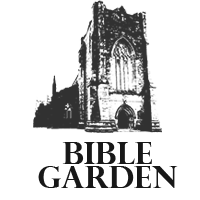Cypress (Cupressus sempervirens)
Map Position: 22The wood of cypress trees is very resistant to decay and is therefore suitable for both interior and exterior use.
It is used for construction, especially for doors, for shipbuilding, for carving of statues, for coffins and for musical instruments. The tree has become a symbol of death, hope, reflection, and eternity. Therefore, it has been planted in and around cemeteries till today. In Egypt it was used in the mummification process. It gave the name to the island Cyprus.
Because of its shape, it became a symbol for tall people, and a symbol of kings. Beautiful and beloved people were called “walking cypress”.

Biblical
It is used or translated in different editions of the Bible synonymously with cedar, oak, and fir.
When Solomon asked Hiram the King of Tyre weather he could supply him with materials to build a temple, Hiram responded: “I have heard the message which you have sent to me; I am ready to do all you desire in the matter of cedar and cypress timber” (1.Kings 5.8).”So Hiram supplied Solomon with all the timber of cedar and cypress that he desired” (1.Kings 5.10) and “as much as he desired” (1.Kings 9.11). Solomon’s request for cypresses from Lebanon is also mentioned in 2.Chronicles 2.8.
The specifications of the house are mentioned: “He covered the floor of the house with boards of cypress” (1. Kings 6.15) and “two doors of cypress wood” (1. Kings 6.34).” The nave he lined with cypress” (2. Chronicles 3.5).
When the Jews were harassed by the Assyrians, the Jewish king Hezeki’ah prayed to the Lord for help. Through the prophet Isaiah the Lord enumerated the Assyrians’ sins, among others that they prided themselves to have gone up the heights of the mountains of Lebanon and “felled its tallest cedars, its choicest cypresses” (2. Kings 19.23 and Isaiah 37.24).
Wisdom is praised and compared to beautiful trees: “I grew tall like a cedar in Lebanon, and like a cypress on the heights of Hermon” (Sirach 24.13 - RSV).

Sirach mentions the impression that Simon the High Priest made on his people: he looked “like an olive putting forth his fruit, and like a cypress towering in the clouds” (Sirach 50.10 - RSV).
When the Jews returned from exile, everyone and everything rejoiced: “The cypress rejoice at you, the cedar of Lebanon, saying ‘Since you [the king of Babylon] were laid low, no wood cutter comes up against you” (Isaiah 14.8).
The Lord promised to turn infertile areas like wilderness and the desert into productive land: “I will put in the wilderness the cedar, the acacia, the myrtle, and the olive. I will set in the desert the cypress, the plane, and the pine together” (Isaiah 41.19).
But he warns His people against making idols out of cypress or other wood and worshipping them. (Isaiah 44.14).
And He will continue to look after His people: “Instead of the thorn come up the cypress; instead of the brier shall come up the myrtle; and it shall make a name for the Lord, an everlasting sign which shall not be cut off” (Isaiah 55.13).
The Lord promises His people a beautiful land: “The glory of Lebanon shall come to you, the cypress, the plane, and the pine, to beautify the place of my sanctuary, and I will make the place of my feet glorious” (Isaiah 60.13).
When Israel repented after worshiping idols, the Lord, who loves His people, forgave them: “It is I who answer and look after you. I am like an evergreen cypress, from me comes your fruit” (Hosea 14.8).
The soldiers of the Lord who destroy sinful Nineveh are described; they are armed with the best weapons, including with spears of cypress (Nahum 2.3).
Zechariah describes the destruction of Lebanon, the enemy of the Jews: “Wail, O cypress for the cedar has fallen, for the glorious trees are ruined! Wail, the oaks of Bashan, for the thick forest has been felled!” (Zechariah 11.2).
